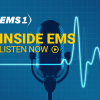Download this week’s episode on iTunes, SoundCloud or via RSS feed
In this week’s Inside EMS Podcast, hosts Chris Cebollero and Kelly Grayson discuss the Dec. 14 anniversary of Sandy Hook, and the effect it still has on responders.
“Even after all this time, we’ve got to be able to reach out to these folks, and give them the care they need,” Cebollero said.
The story addresses the notion that emergency service workers are not immune to emotional injury from traumatic events. Many of us fail to recognize the emotional toll trauma has, and the fact that providers don’t even have to experience the call directly to feel the impact, Grayson said.
In the news, they discuss a precedent-setting case out of Canada where a paramedic was sentenced to two years of probation and 200 hours of community service for not properly treating a patient who later died in a hospital of his injuries.
“Not only can you be held civilly liable, well professional so, but they can actually punish you for a breach of care,” Grayson said.
Cebollero said EMS has a responsibility, and providers should be held liable for not doing something that could make a difference in a patient’s survival.
“We have to be able to take those consequences if we throw that responsibility out the window,” Cebollero said.
They also highlight a religious freedom bill passed by the Michigan House of Representatives, and whether it could allow EMT’s to refuse treatment based on religious beliefs.
Is it really coming down to the fact, Cebollero asked, that if someone is in cardiac arrest, an EMT would have the opportunity to not treat a patient whose sexual orientation is against his or her beliefs?
Grayson agreed, saying the legislation is being taken to the logical extreme.
“I think it’s incredibly poorly conceived, and needs to be immediately repealed,” Grayson said. “I don’t want my politicians meddling in my religious beliefs and in my church, and I don’t want my preachers telling me how to vote.”
They also talk about a recent study that determined many Latinos don’t call 911 out of a fear of police, language barriers and a lack of knowledge about cardiac arrest symptoms.
“The last thing I’m looking at when treating a patient is their immigration status,” Grayson said.
Cebollero and Grayson also address three Florida dispatchers who were fired for not alerting responders that a man at a house fire had threatened to shoot arriving law enforcement. Police and firefighters were ambushed; a deputy was killed and one was wounded before the man was killed.
“It’s their job … to make sure we stay safe,” Cebollero said. “Three people lost their job, and I think it was just.”
Grayson agreed, saying a dispatcher’s role is to pass on critical information, and if there’s any place where there should be a criminal liability in EMS, this is it.
“If you can’t do that, not only should you not be working as a dispatcher, you should be in jail for not passing on that information that directly led to injury and death,” Grayson said.












